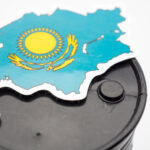(Oil Price) – Kazakhstan cannot reduce its oil production as it has no right to impose output reductions on international firms that are operating more than 70% of Kazakhstan’s oilfields, Energy Minister Yerlan Akkenzhenov said on Thursday.
“The republic has no right to enforce production cuts” on the three large international consortiums, Bloomberg quoted Akkenzhenov as saying.
Earlier this month, Chevron’s chief executive, Mike Wirth, told analysts at the supermajor’s Q1 earnings call that “On OPEC plus in Kazakhstan, you know, really were not discussions of that. We don’t engage in discussions about OPEC or OPEC plus.”
Referring to the other oilfields, which are operated by state-controlled KazMunayGas, the minister said that Kazakhstan cannot “practically” reduce production at these mature oilfields.
Kazakhstan’s overproduction in recent months has become a major issue for the OPEC+ alliance, of which the country is part. Kazakhstan has been consistently overproducing above its OPEC+ limit and is one of the biggest overproducers alongside Iraq and Russia. This has been a major headache for the other OPEC+ producers, many of which have been sticking to their quotas, especially the leader, Saudi Arabia.
Under the OPEC+ agreement, Kazakhstan’s crude oil production quota is below 1.5 million barrels per day (bpd). The deal doesn’t cover condensate production and has no limits on it.
Last week, Akkenzhenov said that Kazakhstan is likely to top its oil production plan this year, due to the expansion of the Chevron-led Tengiz field.
Earlier this year, Kazakhstan’s energy ministry said that the country plans to produce a total of 96.2 million tons of crude oil and condensate in 2025, or about 2 million bpd, which would be 9.7% higher compared to 2024.
Now Kazakhstan will likely top the production plans for the year, Minister Akkenzhenov was quoted as saying by Russian news agency TASS.
Kazakhstan has promised to “compensate” by shaving 1.3 million barrels from cumulative output by 2026. But with Western oil majors firmly in control of Kazakhstan’s biggest fields, that promise is more theoretical than enforceable.
By Charles Kennedy for Oilprice.com







